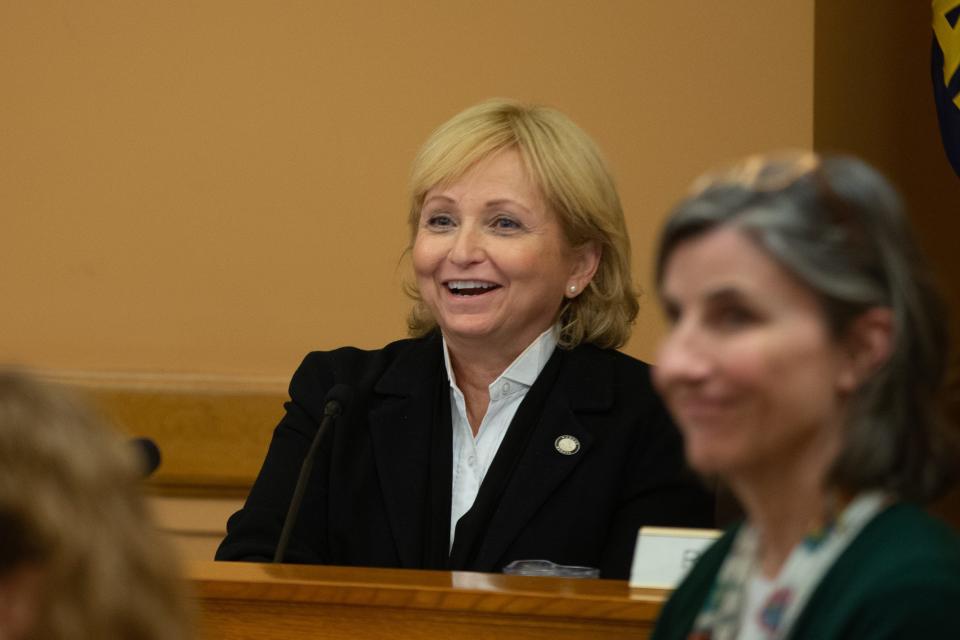Kansas Republicans introduce new tax plan, including a flat tax Kelly promised to veto
- Oops!Something went wrong.Please try again later.
Kansas Republicans introduced a tax bill that maintains a single-rate income tax that Gov. Laura Kelly has repeatedly said she’ll veto and that cratered the last proposed Republican tax plan earlier this year.
Senate Bill 539 includes several of the same changes that Republicans proposed earlier this year, with slightly tweaked numbers. Rather than the 5.25% flat tax proposed earlier this year, which taxes all income at a single rate, the new bill would start taxing a 5.7% rate on all earnings and move it down by 0.05% annually until it reaches a 5.45% rate in 2029.
In addition to the flat tax, the bill would do the following:
Increase the standard deduction for single individual taxpayers from $3,500 to $4,000, and would tie the standard deduction to inflation starting in 2025.
Increase the personal exemption from $2,250 for each dependent from $2,250 per dependent to a base $11,000 for an individual and an additional $3,000 per dependent.
Increases the exemption of social security income from state income taxes from $75,000 gross income to $100,000 and incremental increases to $125,000.
Increase the statewide property tax school levy exemption from the first $42,000 to $80,000.
Eliminate the grocery sales tax to zero starting on July 1.
Reducing the tax rates on banks to 1.63% by 2026.

The bill provides a greater increase in standard deductions and more money for personal exemptions than the Republican’s last plan, which failed to overcome a veto by the governor. It also offers less for the property tax exemption and a higher income tax rate.
Kelly has repeatedly said that she’ll veto any flat tax that comes to her desk. She also has her own proposal, which would exempt all Social Security income from taxation as income, increase property tax exemptions to $100,000 and index it to inflation, increase the standard deduction to $5,000 for an individual and create a sales tax holiday for school supplies.
The last vote to override the governor’s veto failed on a 81-42 vote in the House, which originally passed it with more than the two-thirds majority to overturn the veto. At the time, Rep. Randy Garber, R-Sabetha, explained his change in the vote by saying that there aren’t enough Senate votes to override a veto and that the flat tax was on a “path to failure.”
Rep. Francis Awerkamp, R-St. Marys, testified in favor of the bill and said it's responsive to concerns about who receives the bulk of tax relief. The main charge from Democrats over the past several proposals was that the tax reforms provided too few tax cuts for middle-earners while there are more pronounced benefits for higher earners.
“What I see in this bill is a respect for some of the concerns and objections, specifically, the concern about who receives the benefit of the other bills that failed,” Awerkamp said.
The Department of Revenue estimated that the tax cuts would reduce state revenues by about $1.3 billion between 2025 and 2027.
The Division of Budget said the reduction in the property tax exemption toward K-12 education would need to be offset with money from the general fund to maintain mandated per-pupil funding. The Kansas Department of Transportation reported it may need to reduce planned expenditures on projects if the bill is passed.
Tyson said the committee will vote on the bill tomorrow, and it will then be introduced in the Senate for a vote. Two Republican senators and one conservative Independent senator have endorsed the governor’s plan, and would need to flip their votes, or convince three Democrats to join them, to secure a veto-proof majority.
This article originally appeared on Topeka Capital-Journal: Kansas Republicans take second shot at tax cuts after failed override

